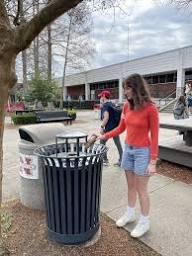The Commission on Colleges of the Southern Association of Colleges and Schools last month at its annual meeting in Orlando, Fla. awarded Nicholls with a reaccreditation for another 10 years and gave the University no recommendations for improvement. “We are very pleased,” Carroll Falcon, provost and vice president of Academic Affairs, said. “It is unusual to come through and receive no recommendations.”
Allayne Barrilleaux, assistant vice president for Academic Affairs and Nicholls’ coordinator for SACS-COC reaccreditation, said for students, this recognition means their credits will continue to be recognized by any other regionally accredited university in the country. She said it also means the University will maintain its federal funding.
According to data from the Office of Financial Aid for fall 2005 through summer 2006, Nicholls students received $23,422,877 in federal aid in the form of Pell grants, Supplemental Educational Opportunity grants, loans and federal workstudy.
“It also means that we meet the standards that have been set by our peer institutions that define a quality institution,” Barrilleaux said. “We (faculty and staff) have worked hard to meet these quality standards.”
Falcon said the SACS-COC team was impressed by Nicholls’ Quality Enhancement Plan, known as “L’esprit engage'” or “The Engaged Mind.” He said the committee felt the QEP was “timely and appropriate.”
“The QEP is related to students more so than anything else about this accreditation because it’s our plan for enhancing student learning,” Barrilleaux said.
Chris Rachal, assistant professor of psychology and counselor education and chairperson for the QEP, said the student engagement aspect of the QEP requires all students to take University 101, where students use strategies to help them discover their strengths and weaknesses. He said they also use programs that aide with career exploration.
In fall 2007 more programs will be implemented to encourage the development of students’ critical thinking skills, Rachal said.
This will include implementing strategies to improve critical thinking skills in English 101 and 102 classes and developing “learning communities,” he said.
The learning communities will consist of groups of students who take three classes together, and the teachers of those classes will collaborate on their teaching methods, Rachal said.
For the faculty engagement QEP component, the Center for Advancement of Faculty Engagement was established in fall 2006. Ray Giguette, associate professor of mathematics and computer science and director of the CAFE, said the center in Elkins Hall is used to organize faculty development activities, such as having workshops and hosting guest speakers.
“We want to encourage the atmosphere of collegiality,” he said. “We want teachers to get to know each other, work on projects together and meet people from different departments.”
The SACS-COC team gave an off-site evaluation of the University based on accreditation documents submitted in November 2005.
The team then visited the campus in March for its on-site evaluation.
Barrilleaux said 10 years ago Nicholls had several recommendations for improvement.
“Ten years ago they (SACS-COC) really changed the criteria a lot,” she said. “We didn’t have some of the processes in place that we do now; it was a whole different ball game.”
She said 10 years from now some of the criteria could change again, but it is unlikely.
For the future, Barrilleaux said she wants to make sure all accreditation procedures are maintained.
“We want to keep it going for the next 10 years so that when we come up again everything is in place and it’s just a matter of putting it in a document to submit,” Barrilleaux said.
SACS-COC is the regional accrediting body for Alabama, Florida, Georgia, Kentucky, Louisiana, Mississippi, North Carolina, South Carolina, Tennessee, Texas and Virginia. There are five regional accrediting bodies in the U.S. It is also the accrediting body for Latin American institutions that award associate, baccalaureate master’s or doctoral degrees.







